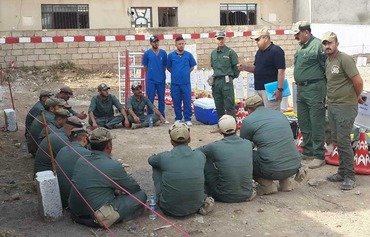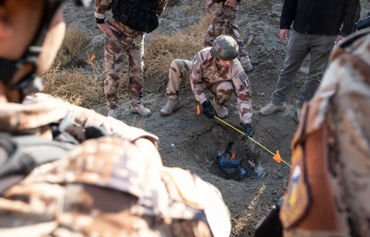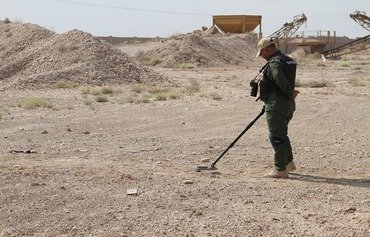The Iraqi border town of al-Qaim district in western Anbar has been fully cleared of landmines and explosive remnants of war left behind by the "Islamic State of Iraq and Syria" (ISIS), according to its local authority.
"The district is now free of landmines and explosives that were planted by ISIS during its occupation of our area," al-Qaim mayor Ahmed al-Dulaimi told Diyaruna in September.
"We have cleared the centre of the district, its villages and countryside, in addition to the desert and the areas close to the border strip with Syria," he said.
Operations to clear the area of explosives began soon after the district was liberated from ISIS two years ago, "thanks to the diligent efforts of the army's military engineering teams", he said.
![Military engineering units dismantle explosive devices left by ISIS in Anbar province on August 7th, 2018. [Photo courtesy of the Iraqi Ministry of Defence]](/cnmi_di/images/2019/10/08/20050-Iraq-Anbar-soldier-600_384.jpg)
Military engineering units dismantle explosive devices left by ISIS in Anbar province on August 7th, 2018. [Photo courtesy of the Iraqi Ministry of Defence]
"Bomb detection and removal experts from national and international organisations also joined the effort," al-Dulaimi said.
Expansive field surveys of residential homes, government buildings and lands that are suspected of being contaminated with mines were conducted, he said.
This was followed by the safe removal and detonation of explosives, he said, noting that "clearing our areas from thousands of remnants of war and unexploded bombs has helped our efforts to repatriate IDPs to their homes throughout the province".
More than 75% of 190,000 residents who were forced to leave the district in 2014 have returned so far, he noted.
'Huge sacrifices'
The security forces' engineering teams "have made tremendous efforts to rid Anbar's cities and villages of explosives, making huge sacrifices towards that end," Anbar provincial council security committee chairman Naeem al-Koud told Diyaruna.
He said securing al-Qaim is an important achievement and a big step in the direction of removing all landmines and explosive devices from Anbar.
"During its control of our province, the terrorist group ISIS dedicated most of its activities to rigging houses and buildings with explosives," he said.
They went to great lengths to contaminate large areas with explosives, in addition to storing explosive devices and weapons in cities and desert areas, he added.
Security forces have managed to remove most of these remnants but the danger "is not yet completely eliminated" in the Anbar desert and some remote villages, he said.
Al-Koud called on international organisations to step up their efforts in this regard through providing technical skills, technological devices and assistance in removing mines and raising awareness about their danger.
Citizens are instructed to call the Directorate of Mine Action's (182) toll free number upon encountering any foreign object, or the Civil Defence Directorate’s (115) toll free number.
Enhanced security
"Landmines have been amongst the biggest challenges to our efforts in returning displaced families to their homes," said Mustafa Hamid, director of the Ministry of Migration and Displacement's Anbar office.
Security forces have faced this challenge with significant determination, he said, and have been working with the office and other service sector ministries to facilitate the return of IDPs as soon as their neighbourhoods are fully cleared of explosives.
Over the past three years, the ministry has succeeded in returning 225,000 IDPs to their original areas in Anbar and closed down a large number of camps, particularly in the eastern part of the province, he told Diyaruna.
"Current reports point to the existence of less than 100,000 remaining IDPs, not all of whom are in camps as a large number have settled in other provinces or have left the country," he said.
Meanwhile, ministries and local authorities are working hard on rebuilding damaged infrastructure and reviving all service and development sectors, he said.

![Efforts are underway at Anbar schools to raise awareness of the dangers of landmines planted by ISIS in the province. [Photo courtesy of the Iraqi Ministry of Defence]](/cnmi_di/images/2019/10/08/20049-Iraq-Anbar-school-600_384.jpg)






